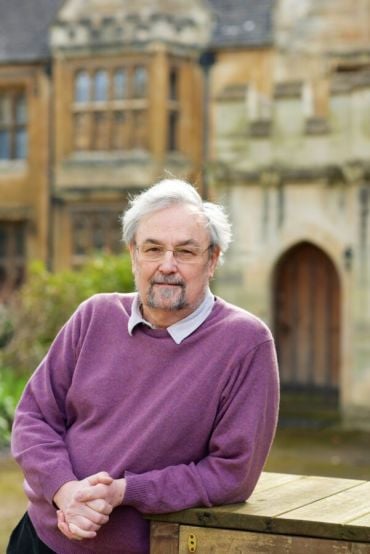
Communities and your mental health
Every May since 2001, Mental Health Awareness Week has helped to highlight how people across the UK can take care of their mental wellbeing. The theme for 2025 is ‘Community,’ and shines a light on how strong connections with others help you thrive – giving you a sense of belonging, safety and support in hard times. We spoke with Robin Dunbar, Professor of Evolutionary Psychology at the University and Fellow of Magdalen College, for some expert advice on building your community while studying at Oxford.
 A portrait of Professor Robin Dunbar
A portrait of Professor Robin Dunbar“Your college is a great place to start. Colleges are your immediate access to community, and they’re small enough that you’ll keep bumping into people. The close proximity of everything in a tightly-knit city like Oxford make it easier to form friendships, and it’s worth getting involved in everything your college has to offer – from your JCR or MCR, to events and dinners, clubs and societies, and the support services available to you from peers and staff.
“Clubs and societies are a secure base from which you can seek out new experiences and visit new places with a group of likeminded people. For international students and others seeking cultural or place connections, societies can offer a sense of home.
“It’s a good idea to be proactive – I would recommend joining societies that give you a break from your academic work. They let you meet people with similar interests and give you the chance to take part in group activities that generate positive friendship and release endorphins. Singing in a group and playing non-competitive sports are brilliant ways to generate what are called ‘affiliative relationships’.
“On the academic side, it’s worth getting to know your tutorial partners. One benefit of the way we teach at Oxford is that the small group setting encourages you to work together, which is a great way to form community.
“Those connections can last for a lifetime. It’s worth taking advantage of Oxford’s alumni networks when you leave, as students regularly come back to the city for dinners and events at their colleges, and these can help you maintain long-lasting friendships in the years to come.
“Finally, dedicate time to your friendships to help them grow. It can be tricky to maintain connections when you have deadlines approaching, but it’s important to devote time to your friends and relationships – not least because this helps you get the most out of them, too.”
Tips on finding your community
Join clubs and societies
Societies are a great way to meet people, provide a sense of belonging, and offer a base from which to have new experiences and explore new places. Try to join societies in a different area from your academic work. They let you meet people similar to you, and give you the chance to take part in group activities that generate positive friendships and release endorphins. Visit the register of student clubs and the A-Z of sports activities at Oxford for the full list of what's on offer.
Make friends within your subject
The small-group teaching offered at Oxford encourages you to work together, which is a great way to build community. You can help each other out when struggling with problems and reading and respond thoughtfully to each other’s work in tutorials.
Dedicate time to friendships
It’s sometimes tricky to maintain friendships when you’re busy studying with deadlines, but it’s important to dedicate time to friendships to help them grow, and for you to get the most out of them, too!
Take advantage of Oxford’s alumni networks
Students come back regularly to their colleges, and this can keep you in touch with a lifelong community of friends.
Make meaningful digital connections
Social media can be overwhelming, but it can also help you to stay in touch with friends and connect you with student groups that you might otherwise have overlooked. It’s worth thinking critically about how you invest time in different platforms, and working out which networks make you feel positive and connected (and which don’t!) Allow yourself to be selective about the technologies that you use to enhance your community.
Don’t worry if you don’t immediately find your group
Everyone’s experience is different and the University is a great place to meet new people. It’s good to be proactive and try some of the suggestions above – get involved in your college, clubs and societies, your subject and with alumni events.
The Mental Health Foundation offer a range of articles on supporting good mental health and preventing mental health problems. Visit their website to learn more.
 Student story: Finding space for Kosovo at Oxford
Student story: Finding space for Kosovo at Oxford
 Oxford students shortlisted as McCall MacBain Scholarship finalists
Oxford students shortlisted as McCall MacBain Scholarship finalists
 Student story: My time at Oxford has been deeply transformative
Student story: My time at Oxford has been deeply transformative
 Welfare blog: Dealing with imposter syndrome
Welfare blog: Dealing with imposter syndrome
 Student story: Rowing sabbatical officer
Student story: Rowing sabbatical officer